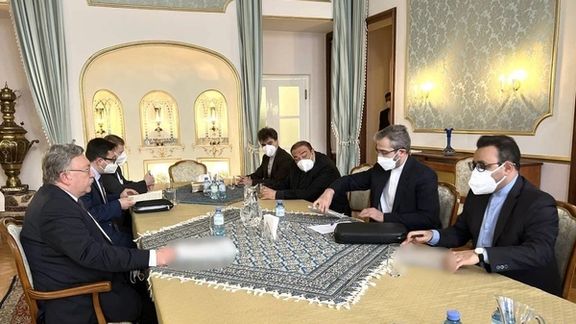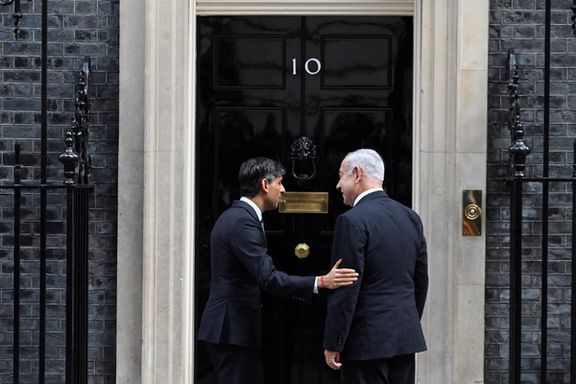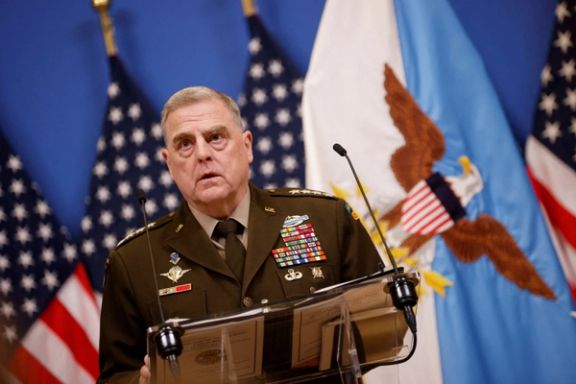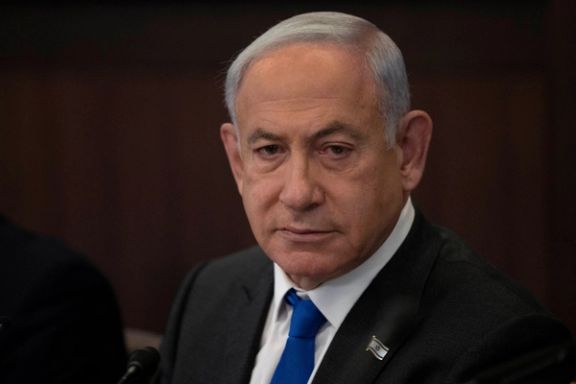Biden Admin Discussed A Partial Iran Deal With Allies - Axios

The Biden Administration has been entertaining the idea of a partial nuclear deal with Iran and has discussed it with allies, Axios reported on Monday.

The Biden Administration has been entertaining the idea of a partial nuclear deal with Iran and has discussed it with allies, Axios reported on Monday.
According to a report by Barak Ravid, its correspondent in Israel, Axios said that according to ten Israeli and Western sources the administration shared the plan with allies.
In exchange for freezing Iran’s uranium enrichment at 60 percent the US would ease some sanctions. If true, Iran would gain the advantage of being a few months away from producing 90-percent enriched uranium needed for a nuclear weapon and enjoy the benefits of sanctions relief.
The report says that Israeli officials told the Biden team that Iran would be threading on dangerous ground that could lead to an Israeli military strike if it enriches above the 60-percent level.
Since September when nuclear talks reached a deadlock the Biden administration has been insisting that it is no longer focused on restoring the 2015 nuclear deal known as the JCPOA. The White House has been insisting on Iran respecting human rights and refraining from supplying weapons to Russia, in what seems to be a new and tougher position regarding the Iranian regime.
A US National Security Council spokesman told Axios that the administration is “absolutely committed to ensuring Iran never acquires a nuclear weapon, and we still believe diplomacy is the best way to achieve that objective,” but rejected the report of a partial deal as second-hand rumors, insisting that “nearly all such rumors are false.”.

A deputy commander of Iran’s Revolutionary Guard has said that people’s livelihood cannot be improved with negotiations, referring to talks with the West.
Gen. Mohammad-Reza Naghdi, the coordinating deputy to IRGC commander Hossein Salami, in a speech on Wednesday stressed that Iran needs to rely on its internal capabilities instead of counting on economic improvement through negotiations. He was referring to nuclear talks with the United States and its allies that could lift sanctions and offer the battered economy a lifeline.
Naghdi also repeated criticism by other hardliners that former President Hassan Rouhani linked the fate of the country to negotiations with the West.
Iran’s economy entered a long-lasting crisis after 2018 when former US President Donald Trump withdrew from the 2015 nuclear deal known as the JCPOA and imposed sanctions.
Naghdi also urged Iranians to obey Supreme Leader Ali Khamenei to achieve a better future. Last week, clerics loyal to Iran’s 83-year-old ruler also praised him as God’s representative and urged obedience.
Anti-regime protests that began last September in Iran were largely directed against Khamenei, who is seen by many as dictating policy at every level and responsible for increasing poverty in the country. Most Iranians are in favor of talks with the West and yearn for the lifting of sanctions to improve their lives.
Protesters also want social and political freedoms and see Khamenei as the leader of hardliners who control the authoritarian government.

Russian chief negotiator in Iran nuclear talks, Mikhail Ulyanov, says the “Western partners” still refrain from announcing the "death" of negotiations to revive the JCPOA.
Ulyanov said on Monday that the talks to restore the nuclear deal with the Islamic Republic remains at an impasse, noting that chances of completing the negotiation process are very small.
The volte-face comes despite Ulyanov usual optimism, as the only voice who kept vouching for the success of Vienna talks with tweets about the prospect of restoring the Joint Comprehensive Plan of Action (JCPOA) or the Iranian nuclear program.
“Formally, a draft package solution remains on the negotiating table, providing for a phased return of Iran to the fulfillment of its obligations under the JCPOA and the lifting of illegitimate US extraterritorial sanctions against the Islamic Republic of Iran,” Ulyanov said.
“This package is the result of intensive and lengthy negotiations in Vienna with the participation of Russia, Iran, China, the Eurotroika, the United States and the EU Foreign Service, which acted as a coordinator,” he added.

Russia was an active player in the talks from April 2021 to February 2022, when it invaded Ukraine. The negotiations in Vienna ended in early March. The chief US negotiator Robert Malley was often meeting with Ulyanov to discuss the talks.
The last push by the EU to broker a deal in August 2022 reached a deadlock amid key disagreements between Tehran and Washington, as well as the Islamic Republic’s vague response to the IAEA about uranium traces at several sites.
Behrouz Kamalvandi, spokesman of Iran's atomic agency told a press conference on March 15 that “If there will be further questions, we will answer and talk to each other to determine how these issues can be followed up,” referring to issues related to the IAEA.
The IAEA discovered three undeclared locations in 2019 with traces of uranium. The locations dated back to before 2003 when Iran had a secret nuclear program. The UN nuclear watchdog has been demanding satisfactory answers about the three sites but it says that so far Tehran’s explanations have not been technically credible.
Tehran is now seeking to restore the nuclear agreement to see the sanctions lifted, but US officials have repeatedly said their focus is not on the revival of the JCPOA at the moment. Meanwhile, the IAEA confirmed earlier this year that its inspectors had found particles of enriched uranium with a purity of 83.7 percent at Fordow enrichment facility near Tehran.
However, following a visit to Tehran earlier this month, IAEA chief Rafael Grossi said Iran is ready to cooperate on the three locations and agreed to re-install additional monitoring equipment such as cameras at nuclear sites.
Grossi stressed that agreements still need to be discussed and he cannot yet guarantee the success of his negotiations with Tehran. After more than three weeks there have been no meetings to resolve issues, despite Grossi’s earlier promises in March that there would be “meetings soon.”

Israeli will respond if Iran enriches uranium to weapons-grade 90 percent, even without US help, Benjamin Netanyahu has told his British counterpart.
A senior Israeli official, who accompanied Netanyahu on his trip to London on Friday, informed Iran International that the Israeli prime minister told UK's Rishi Sunak that "military attacks on nuclear facilities in Iran are not the only solution for Israel, and this country is considering other solutions to stop Iran."
Since mid-2020, several acts of sabotage and explosions in Iran's nuclear facilities have been attributed to Israel.
Successive Israeli governments have firmly stated that the Jewish state will not tolerate a nuclear armed Iran and will use all options to protect its security.
This senior official added that Israel demands US military support and European sanctions to prevent Iran from moving towards 90% uranium enrichment. Iran has been enriching up to 60 percent since 2021 in violations of the 2015 nuclear accord with world powers, known as the JCPOA.
US officials have said that Iran has accumulated enough enriched uranium to be able to produce sufficient for producing enough fissile material for a nuclear weapon in two weeks.
The United States has adopted a tougher tone toward Iran since long-running nuclear talks reached a deadlock last September and public opinion was shaken by a violent and deadly crackdown of protests in Iran. Western powers have also become alarmed by Iran’s delivery of suicide drones to Russia.
Israel and Britain have highly advanced intelligence ties, and their cooperation has so far prevented terrorist attacks by the Islamic Republic in Europe.
Netanyahu met with his British counterpart Rishi Sunak in London on Friday to discuss Iran’s nuclear and conventional threats, among other issues.
Readouts of the Friday meeting from both sides said the two talked about the security and defense challenges they share, including the threat posed by Iran, as well as ways to strengthen the relationship between Britain and Israel.
Netanyahu also invited Sunak for an official visit to Israel, the Israeli statement said. He left Downing Street less than an hour after he arrived as hundreds of protesters gathered at the gates of No 10 to demonstrate against the Israeli prime minister’s policies, especially his overhaul of the judiciary.
Downing Street said that in his meeting with Netanyahu, Sunak "stressed the importance of upholding the democratic values that underpin our relationship, including in the proposed judicial reforms in Israel.”
It added that the two men also discussed the war in Ukraine and Iran's "destabilizing activity", as well as its nuclear program, and agreed that their “governments would continue to work closely together to push back against aggression and manage the risk of nuclear proliferation.”
Earlier in the week, Israeli Foreign Minister Eli Cohen was in London to press Jerusalem’s position about the Islamic Republic’s threat and bolster bilateral economic ties.
The Israeli diplomat signed an agreement called the 2030 Roadmap for UK-Israeli Bilateral Relations, which according to the British Foreign Office “contains detailed commitments for deepening cooperation across the breadth of the Israel-UK relationship, including on trade, cyber, science and tech, research and development, security, health, etc.”

A statement by Gen. Mark Milley, Chairman of the US Joint Staff, about Iran’s development of nuclear weapons has raised eyebrows of experts and observers.
During a Congressional testimony on Thursday, warning about the dangers Iran poses Gen. Milley said, “The United States remains committed as a matter of policy that Iran will not have a fielded nuclear weapon.”
The term “fielded” has led to questions about what the Biden administration’s policy exactly is regarding Iran becoming a nuclear power. Previously, President Joe Biden and all top officials had repeatedly said that US policy is not to allow the Islamic Republic to acquire a nuclear weapon, threatening that all options are on the table.
Now, with the Pentagon chief saying that the US would not allow a “fielded” nuclear weapon, some ask if the administration would allow Iran to build a bomb but not “field” it, which in essence is a vague concept.
Being a nuclear threshold state is a familiar concept, meaning that a country has the fissile material and the knowhow to build a nuclear bomb but has not decided to do so, but once a bomb is produced, it is not clear what the difference is between a bomb in the basement and one “fielded.”
Former senior US diplomat and Middle East expert Dennis Ross tweeted that “Did General Milley misspeak or is US policy now to respond only if Iran deploys a nuclear weapon or in the General’s words has a “fielded nuclear weapon.” That implies that Iran can develop a bomb but we would respond only if they deployed it. If true, Iran will develop a bomb.”
Milley also said during his testimony that Iran can have enough fissile material for a bomb in two weeks and it would need just a few months to build a bomb. The timeline he mentioned about fissile material was in line with what Under Secretary of Defense for Policy Colin Kahl said last month, but the estimate of just a few months needed to build a bomb was more alarming than previous US predictions.
Gabriel Noronha, a former Trump administration official tweeted, “It implies that Iran has started to conduct weaponization activities, something US intelligence officials have not publicly stated before this point - even as recently as a couple weeks ago.”
Milley also said, “We, the United States military, have developed multiple options for our national leadership to consider if or when Iran ever decides to develop an actual nuclear weapon.”
This last comment seems to be different from the earlier one and more in line with declared administration policy. As Ross said in his tweet, did Gen. Milley misspeak?
The administration will be most probably asked about this, but the Islamic Republic will surely take notice of the general's remark about a "fielded" nuclear weapon, even if later it is explained away.
So far, government media in Iran have not mentioned Milley’s statement, but it could simply be that the country is in the midst of Nowruz holidays.
The Biden administration has adopted a tougher tone toward the Iranian regime since September when nuclear negotiations reached a deadlock and antigovernment protests in Iran changed the agenda. In addition, the US and its allies are outraged by Iran’s delivery of killer drones to Russia.
Iran-linked forces conducted two attacks on US forces in Syria on Thursday and Friday, and some observers noted that such attacks in Iraq and Syria have noticeably increased since the Biden administration came to office and began nuclear talks with Iran.

Israeli Prime Minister Benjamin Netanyahu is due in London to discuss solutions to Iran’s continued nuclear armament.
The Israeli premier, scheduled to meet with British Prime Minister Rishi Sunak and Home Secretary Suella Braverman on Friday, is slated to depart on Thursday evening.
According to a statement from Netanyahu’s office, his meetings in London will focus on the need to formulate a “united international front” against Iran in order to stop its nuclear program.
The leaders will also discuss strengthening strategic ties between Israel and the United Kingdom, including increasing security and intelligence cooperation and the war in Ukraine as well as broad developments in the Middle East.
Earlier in the week, Israeli Foreign Minister Eli Cohen was in London to press Jerusalem’s position about the Islamic Republic’s threat and bolster bilateral economic ties.
The Israeli diplomat signed an agreement called the 2030 Roadmap for UK-Israeli Bilateral Relations, which according to the British Foreign Office “contains detailed commitments for deepening cooperation across the breadth of the Israel-UK relationship, including on trade, cyber, science and tech, research and development, security, health, etc.”

Netanyahu’s trip to London comes on the heels of his visit last week to Berlin, where he met with German Chancellor Olaf Scholz, and other senior German officials. As he stood with Scholz at the Holocaust memorial Platform 17 in Berlin, Netanyahu appeared to compare Iran with the Nazis.
Seemingly alluding to the Islamic Republic rhetoric which calls for the end of the ‘Zionist regime’, he said: “The calls to destroy the Jewish people have not ended. The main lesson we have learned is that when we are faced with such evil, we must stop the evil plans early to prevent a disaster."
A senior Israeli official, who spoke to Iran International on condition of anonymity, said Netanyahu's recent visits to Europe aim to convey a strong message that Israel would act alone against Iran and would do whatever it deems necessary against the Islamic Republic’s nuclear program.
“Recent trips to some European countries and meetings with the leaders of these countries are both a message for Europe and a direct message for the Iranian government," the source said, noting that Tehran has "received" this message.
Earlier in the month, Netanyahu met with Italian premier Giorgia Meloni when both called for bolstering bilateral ties. His meeting with Meloni came just after Iran and Saudi Arabia announced a resumption of diplomatic ties, a development that Netanyahu was widely criticized at home for failing to prevent.
On Wednesday, a senior Israeli diplomatic official told Axios that the Israeli government sees the recent agreement between Saudi Arabia and Iran not as a threat, but as an opportunity for Israel’s efforts to normalize relations with the Saudi kingdom.
The official who is directly involved in the efforts said that the war in Yemen has been a major "irritant" in US-Saudi relations in recent years, hampering efforts for Israel-Saudi normalization steps. ”The more relations between the US and Saudi Arabia improve, the easier it will be to work on promoting normalization between Saudi Arabia and Israel,” the official said.
On Wednesday, Israel warned the Biden administration and several European countries that Tehran would be entering dangerous territory that could trigger an Israeli military strike if it enriches uranium above the 60-percent level.
According to an International Atomic Energy Agency report from late February, Iran has amassed 87.5 kilograms of 60% enriched uranium. Experts say if uranium is enriched to 90% weapons grade, it would be a sufficient quantity to produce at least one nuclear bomb.
Netanyahu has time and again threatened military action against the Islamic Republic’s nuclear program as it enriches uranium closer to weapons-grade levels.
On March 9, Netanyahu told Iran International that Tehran is “dangerously moving forward” in its nuclear program, claiming that he returned to the government primarily to make sure that Iran cannot become a nuclear “threshold power”.
The PM’s whirlwind of foreign trips is seen by some as a distraction from the civil uprising happening at home as Israelis protest against proposed legal reforms which would make Netanyahu largely unaccountable. It would also give him a clear way out of criminal charges he faces, though he denies all counts.
The exact time and location of his departure is not yet known even to reporters who will be accompanying Netanyahu during the diplomatic visit to London because protesters have vowed to gather at the site and prevent him from boarding the plane.